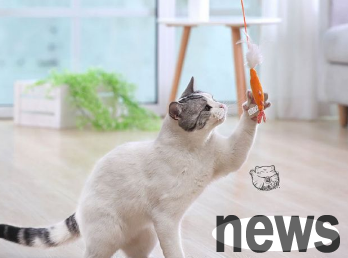Dog Health Census: Dog owners are actually "roaming in place" and confused themselves
"Dog Health Census: Dog Owners Are "Running in Place" and Confusing Self" - This research report initiated by the American Get Joy Dog Health Agency collects online survey data from 1,000 dog owners nationwide, with dog owners between 18 and 70 years old.
Pai Food Record thinks the title of the original English report is very intuitive, and also uses "Chasing Our Tails" for the behavior of pet owners, which is vividly likened by dogs chasing their tails (rotating in place, confusing themselves).

For friends who want to have an in-depth understanding of this topic "Dog Health Census: Dog Owners Are "Running in Place" and Deceiving Self-Doing", you can download this original English report. The download method can be found at the end of the article.
PetFoodie found that the investigation revealed an unexpected phenomenon. . .
Although every pet owner desires his pet to live a healthy and long life, their actual actions seem a bit negligent when it comes to pet diet management. This contradiction is like a little secret in the hearts of pet owners - they understand the importance of diet to pet health, but few people choose to provide pets with fresh food. The generality of this phenomenon is surprising.
Let's talk about several interesting findings from this survey:
Among the 1,000 dog owners surveyed, although almost all pet owners (97%) recognize the impact of pet diet on their longevity, only 12% of pet owners are actually providing fresh food to their dogs. You read that right, although a pet's diet is considered the most important aspect of managing dog health, it has not become a priority for pet owners. What’s even more surprising is that although 83% of pet owners are confident in the food ingredients of their dogs, only 58% are able to name three of them.
A dramatic comparison is presented here:
Up to 94% of pet owners expressed their desire to extend the lifespan of their pets, but in fact, most people (75%) still choose to provide their pets with a slightly "technological and arduous" food produced in industrial processing. The huge difference between behavior and thought is like a pet owner making a beautiful blueprint for the health and nutrition of his pets, but unfortunately causing harm to them inadvertently.

Next, PetFoodie will talk about the important topic of intestinal health that is often overlooked by pet owners. Although as many as 83% of pet owners agree on the importance of gut health to extend the lifespan of their dogs, fewer people actually practice this healthy eating habit—less than 10%. The huge gap between this idea and practical action reminds us that we must strengthen education and awareness of pet diet health, and guide pet owners to understand and implement the best nutritional plans for pets.
Nutrition (feeding) is a small ceremony that we participate in with our dog twice a day. Even a small adjustment can have a significant positive impact on the overall health and happiness of the dog.
PetFoodie feels that this is not just about feeding, it is a lifestyle choice, about how we turn love into action and ensure that our pets get the best nutrition and health.
Dear Maowa parents are facing a choice:
Continue to wander among misunderstandings and convenient choices, or bravely step out of your comfort zone and choose healthy and nutritious foods for our pets?
This is not only an investment in pet health, but also an investment in our relationships. This is a more pragmatic confession to pet lovers, allowing the kids to accompany us for longer.
Below, PetFoodie.CN wants to analyze with you - what is the deeper reason why pet owners are inconsistent with their speeches? This behavioral study reveals obvious contradictions in dog owners’ dietary choices, verbally emphasizing the importance of healthy diets, but not in actual actions.
The reasons behind this may be multifaceted:
1. Convenient and fast
The pace of modern life is accelerating, and many pet owners may seek more convenient solutions to meet pet dietary needs, especially in daily busyness. Processed foods are often easy to store and prepare, and this convenience may be one of the main reasons pet owners tend to choose them.
2. Price factor
For some pet owners, budgeting may be an important consideration. Industrially processed pet food is usually more affordable and is more easily accepted by pet owners than fresh or organic food.
3. Cognitive Gap
Although pet owners may recognize the importance of healthy eating, they may lack sufficient knowledge of what a “healthy eating” is. Advertising and marketing messages may lead them to misleading that certain processed foods can also provide all the nutrition your pet needs.
4. Habits and traditions
Many pet owners may follow long-standing habits or traditional practices, even if these habits are not necessarily the best choice. Changing your eating habits takes time and willingness, not everyone is willing to try new things.
Based on the above analysis, PetFoodie.CN put forward the following suggestions to marketers in the pet food industry for reference:
1. Provide more popular science content
to help pet owners understand the true meaning of healthy eating, including how to read and understand pet food labels, and the long-term benefits of fresh, natural foods.
2. Simplify health options
Develop and promote healthy and convenient pet food options, reduce pet owners' time and energy investment, and make healthy choices easy.
3. Price Strategy
provides competitive prices through cost-benefit analysis, especially for pet owners who want to provide healthy diets for their pets and worry about their budget.
4. Change the concept
Through offline physical community activities of pet owners' lives, enter the last 100 life circles of consumers, gradually change the traditional concepts and habits of pet owners about pet diet, and encourage them to make healthier choices.
By disassembling these deep-seated reasons, pet food brands can communicate more effectively with pet owners, encourage their actions to be consistent with their willingness to eat healthy, and are more conducive to the health and welfare of Maowa.




